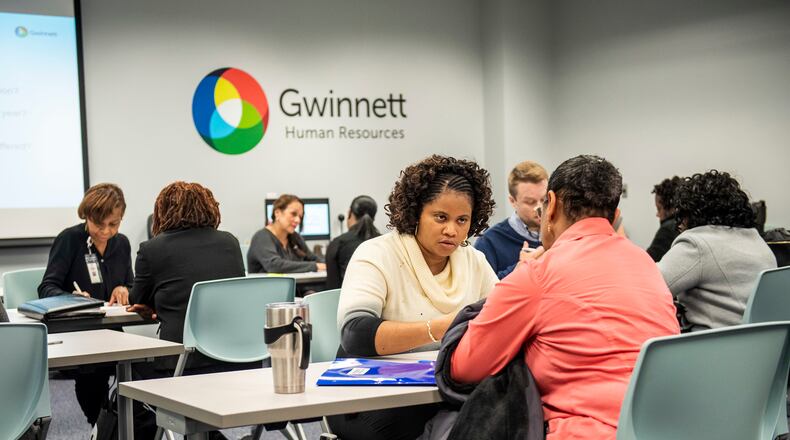Georgia saw another surge in new jobs in July, just as the delta variant began to sharpen concerns about more pandemic pain.
Extending a summer boom, the state added 43,600 jobs last month on top of revised figures for June of just over 40,000 jobs, according to data released Thursday by the Georgia Department of Labor.
In the midst of the job burst, Georgia in late June halted distribution of federal supplements to unemployment benefits that some employers and politicians said was deterring people from seeking work.
The state’s unemployment rate in July dropped to 3.7%, down from 4% in June, the sharpest fall since March. The rate now is just 0.2 percentage points higher than what it was in February of 2020, before COVID-19 slammed Georgia.
Some pockets of the state’s economy now have more jobs than they had before the pandemic, including trade, transportation and utilities as well as professional and business services.
Georgia’s restaurants and hotels sectors haven’t fully rebounded, but they showed some of the most jobs gains in the last month, adding 15,200 jobs over June.
“Georgia continues to recover very well,” said Tom Smith, an economist and Emory University finance professor.
But in recent weeks, the rise of a more transmissible version of the coronavirus has sent COVID-19 cases soaring and sparked fresh questions about what is ahead for the economy. Smith suggested that has affected the decisions of parents who may be holding off on seeking jobs for a few more weeks until they see whether kids will switch to online school classes again. “A lot of people are waiting for the other shoe to fall.”
Georgia’s new jobless claims inched up slightly last week to 11,157 from 10,783 the previous week. While that is sharply lower from earlier in the pandemic, it’s still about twice as high as before the virus arrived.
Georgia Labor Commissioner Mark Butler highlighted a state tally of open job listings that he said is now at least two or three times bigger than it was before the virus hit. There are nearly 200,000 listings, some covering multiple jobs, he said.
Many employers are struggling to fill positions and “that is probably going to continue for some months ahead,” he said.
To get workers they will likely have to continue raising pay, which eventually will lead to higher prices for consumers, he predicted.
Butler said he thinks various issues have cut into the state’s labor pool, from people retiring earlier than initially planned to dual-working households switching to a single wage earner.
But the commissioner also stressed the previous package of pandemic-inspired federal unemployment benefits, including $300-a-week supplements, had kept prospective workers on the sidelines.
At the same time, a number of Georgia employers have recently increased pay and bonuses to retain workers or woo new ones.
Economists for Wells Fargo say Georgia’s new job creation in both June and July were higher than any other month since June of 2020.
In a Thursday research note, they suggested people have been slow to return to jobs in part because of childcare issues and concerns related to COVID-19, but that the largest single factor was the previously expanded federal unemployment benefits, which they think particularly curbed interest in “lower paying jobs in high-contact services.”
Meanwhile, the pool of jobs in Georgia continues to grow.
On Thursday, the state announced plans for 200 new manufacturing jobs in Fulton County by Advanced Modular Structures, which expects to convert shipping containers into trade show displays, stores, offices and affordable homes.
The company, which is tied to a real estate developer, The Integral Group, said it expects to fully begin operations this fall, in a space along Fulton Industrial Boulevard. Hiring is slated to include areas such as administration, sales, project management, accounting, marketing, carpentry and welding.
Also on Thursday, retail giant Target said it will hire 150 full-time staffers by 2025 for a new sorting facility in Gwinnett County. They will work in a 367,000-square-foot facility along Riverside Parkway in the Lawrenceville area.
About the Author
Keep Reading
The Latest
Featured


